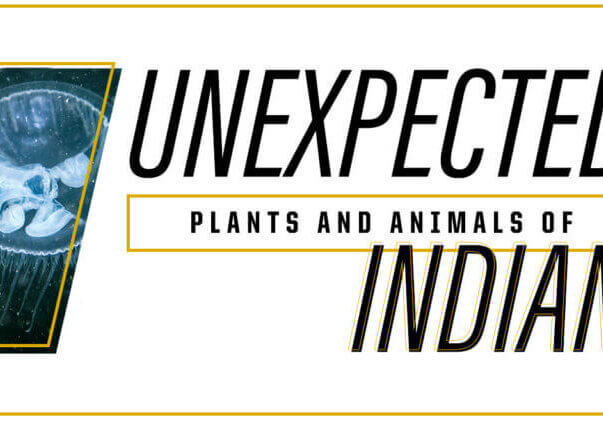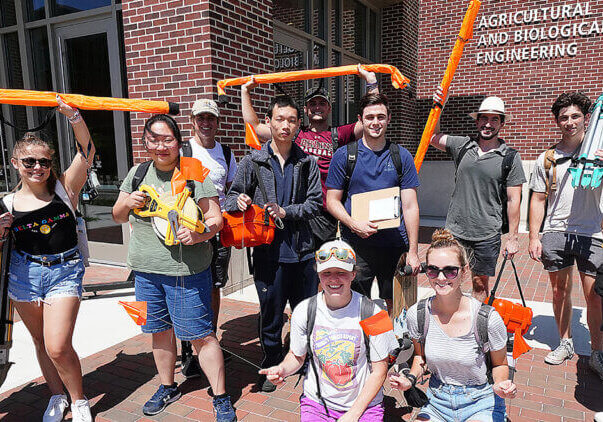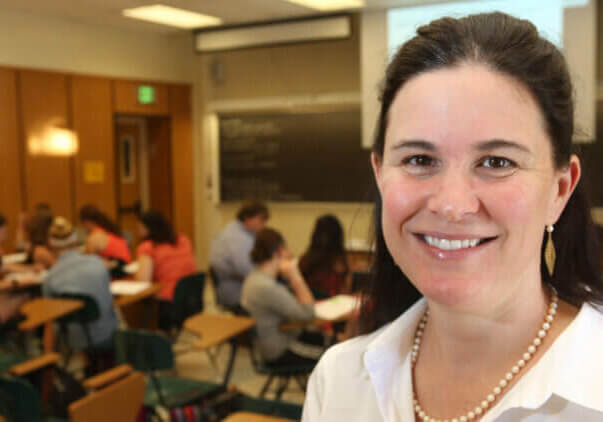I
n October 2019, over 150 companies occupied seven basketball courts in Purdue’s Córdova Recreational Sports Center to participate in one of the nation’s largest agricultural career fairs. The college was planning to expand its Fall Career Fair further in 2020, but then everything changed.
“The pandemic forced us to make a lot of last-minute adjustments and go completely virtual,” recalled Lela Mixon, assistant director for Career Services and scholarship coordinator. “Thankfully, we learned a lot from that experience.
“Now we are in a stage where virtual is part of all of our processes,” said Mixon. “This year we are applying what we learned and offering the best of both worlds: a virtual and an in-person fair.”

Approximately 90 companies will meet with students in person on Oct. 5. Another 45 employers, like Rachel Schuler of Black Gold Farms, opted to attend this year’s virtual fair on Oct. 7.
“Last year was our first online career fair. We loved it,” said Schuler, who represented Indiana’s largest potato grower. “It was so efficient. We could see the resumes and decide which candidates we wanted to speak with ahead of time. We found two amazing interns who I would recommend to anyone.”
96% of the college’s May 2020 graduates found employment or continued their education within eight months.
Hannah Lynch, a regional technology specialist for Ceres Solutions, plans to attend both fairs, aiming to meet as many candidates as possible.
“My first trip to Purdue’s career fair as a recruiter was a great experience,” recalled Lynch. “I was genuinely impressed by how well the students had prepared. You could tell their teachers and courses had set them up for successful interviews.”
Both fairs will incorporate a new interactive tool called Career Fair Plus. The application lets students receive updates on their phones, read employer profiles, share digital copies of their resumes and find booths.
Other available resources include resume reviews by employers on Oct. 4 and professionally photographed headshots on Oct. 5.
“The career fair has opportunities for everyone, not just recruiters and graduating seniors,” explained Mixon. “Every student can learn about our industry, create contacts and develop their professional identity. Those valuable experiences are why I encourage all students to attend.”

Unexpected Plants and Animals of Indiana: Freshwater Jellyfish
Simple and complex are antonyms, but not with jellyfish.
Jellyfish lack brains, bones, hearts and lungs. More than 95% of their bodies are water. Early scientists debated whether jellyfish were even animals, commonly labeling them “zoophytes,” intermediaries between animals and plants.
Jellyfish meet biology’s modern criteria for classification as animals, yet are not fish despite their name. Their lack of backbones makes them members of the phylum Cnidaria, which includes coral and sea anemones.
Read Full Story >>>Purdue Agricultural Biological Engineering Program Ranked #1
Purdue University’s Agricultural Biological Engineering (ABE) undergraduate program has earned the number one ranking in its category in the annual U.S. News & World Report undergraduate program rankings for the eleventh consecutive year. U.S. News also ranked Purdue’s ABE graduate program number one earlier this year. The department includes 382 undergraduate and 191 graduate students.
Read Full Story >>>PWL instructor saves time, trouble using Variate for personalized math-based assessments
Creating new versions of math-based problems can be time-consuming. Katy Rainey, associate professor of plant breeding and genetics in the Department of Agronomy at the Purdue West Lafayette campus, was looking for a sustainable way to generate unique versions of genetics problems for her course — something she previously did manually every semester.
Read Full Story >>>Unexpected Plants and Animals of Indiana: Freshwater Jellyfish
Simple and complex are antonyms, but not with jellyfish.
Jellyfish lack brains, bones, hearts and lungs. More than 95% of their bodies are water. Early scientists debated whether jellyfish were even animals, commonly labeling them “zoophytes,” intermediaries between animals and plants.
Jellyfish meet biology’s modern criteria for classification as animals, yet are not fish despite their name. Their lack of backbones makes them members of the phylum Cnidaria, which includes coral and sea anemones.
Read Full Story >>>Purdue Agricultural Biological Engineering Program Ranked #1
Purdue University’s Agricultural Biological Engineering (ABE) undergraduate program has earned the number one ranking in its category in the annual U.S. News & World Report undergraduate program rankings for the eleventh consecutive year. U.S. News also ranked Purdue’s ABE graduate program number one earlier this year. The department includes 382 undergraduate and 191 graduate students.
Read Full Story >>>PWL instructor saves time, trouble using Variate for personalized math-based assessments
Creating new versions of math-based problems can be time-consuming. Katy Rainey, associate professor of plant breeding and genetics in the Department of Agronomy at the Purdue West Lafayette campus, was looking for a sustainable way to generate unique versions of genetics problems for her course — something she previously did manually every semester.
Read Full Story >>>

